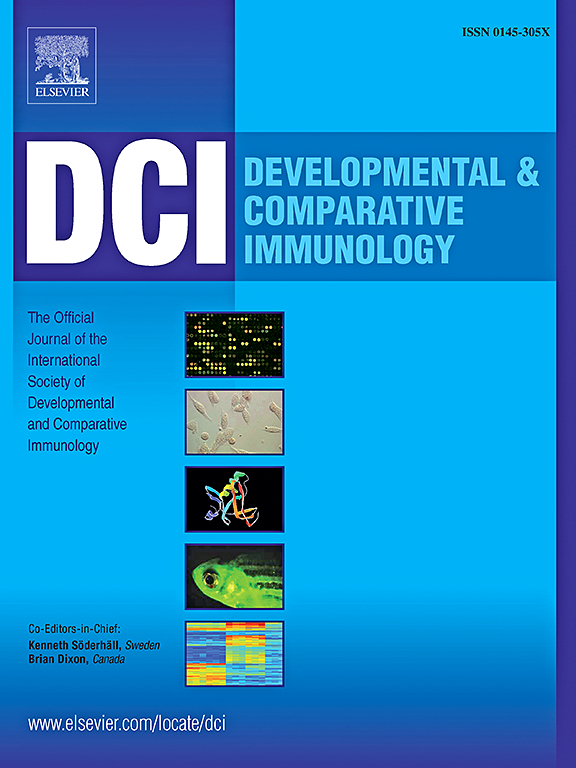CqStathmin negatively regulates white spot syndrome virus infection by destabilizing microtubules in Cherax quadricarinatus
IF 2.4
3区 农林科学
Q1 FISHERIES
引用次数: 0
Abstract
Stathmin is a microtubule-destabilizing protein that disrupts microtubule dynamics by promoting the depolymerization of microtubules or preventing the polymerization of tubulin heterodimers, thereby performing various cellular functions. In this study, a CqStathmin in the invertebrate crayfish was found to be involved in the infection of white spot syndrome virus (WSSV), a DNA virus susceptible to shrimp. The CqStathmin was identified from the red claw crayfish Cherax quadricarinatus, sharing the conserved domain and phylogenetic relationship with stathmin homologs of other species. The expression of CqStathmin was significantly upregulated in crayfish hematopoietic tissue (Hpt) cells after WSSV infection. CqStathmin silencing promoted WSSV infection in Hpt cells. Further evidence indicated that silencing CqStathmin promoted the polymerization of crayfish microtubule structural proteins Cqα-Tubulin and Cqβ-Tubulin, whereas overexpression of CqStathmin facilitated their depolymerization. Silencing of CqStathmin increased the acetylation of Cqα-tubulin in Hpt cells, a post-translational modification that maintains microtubule integrity, thereby promoting microtubule polymerization. In contrast, overexpression of CqStathmin reduced the acetylation level of α-tubulin in HEK293T cells. Then, the binding of Cqα-Tubulin to Cqβ-Tubulin, as well as the interaction of CqStathmin with Cqα-Tubulin and/or Cqβ-Tubulin, along with their co-localization, have been confirmed. These results indicated that CqStathmin has a negative regulatory role in microtubule polymerization in crayfish. Moreover, WSSV infection was significantly decreased by Cqα/β-Tubulin silencing, suggesting that WSSV infection depended on microtubules in Hpt cells. Collectively, our results revealed that CqStathmin inhibited WSSV infection by regulating microtubule depolymerization in the crayfish. This is the first study to report that CqStathmin from an aquatic crustacean was involved in WSSV infection, enhancing our understanding of the WSSV infection mechanism.
CqStathmin通过破坏方鹤微管的稳定性负向调节白斑综合征病毒感染
Stathmin是一种微管不稳定蛋白,通过促进微管解聚或阻止微管蛋白异源二聚体的聚合来破坏微管动力学,从而执行各种细胞功能。在这项研究中,发现无脊椎小龙虾中的CqStathmin参与了白斑综合征病毒(WSSV)的感染,这是一种对虾敏感的DNA病毒。CqStathmin从红爪螯虾(Cherax quadricarinatus)中鉴定出来,与其他物种的stathmin同源物具有保守结构域和系统发育关系。感染WSSV后,CqStathmin在小龙虾造血组织(Hpt)细胞中的表达显著上调。CqStathmin沉默可促进Hpt细胞中的WSSV感染。进一步的证据表明,沉默CqStathmin可促进小龙虾微管结构蛋白cq α-微管蛋白和cq β-微管蛋白的聚合,而过表达CqStathmin则有利于其解聚。CqStathmin的沉默增加了Hpt细胞中cq α-微管蛋白的乙酰化,这是一种维持微管完整性的翻译后修饰,从而促进微管聚合。相反,过表达CqStathmin可降低HEK293T细胞α-微管蛋白的乙酰化水平。然后,证实了Cqα-Tubulin与Cqβ-Tubulin的结合,以及CqStathmin与Cqα-Tubulin和/或Cqβ-Tubulin的相互作用,以及它们的共定位。这些结果表明,CqStathmin对小龙虾微管聚合具有负调控作用。此外,Cqα/β-微管蛋白沉默显著降低了WSSV感染,表明WSSV感染依赖于Hpt细胞中的微管。综上所述,我们的研究结果表明,CqStathmin通过调节小龙虾的微管解聚来抑制WSSV感染。这是首次报道水生甲壳类动物CqStathmin参与WSSV感染的研究,增加了我们对WSSV感染机制的认识。
本文章由计算机程序翻译,如有差异,请以英文原文为准。
求助全文
约1分钟内获得全文
求助全文
来源期刊
CiteScore
6.20
自引率
6.90%
发文量
206
审稿时长
49 days
期刊介绍:
Developmental and Comparative Immunology (DCI) is an international journal that publishes articles describing original research in all areas of immunology, including comparative aspects of immunity and the evolution and development of the immune system. Manuscripts describing studies of immune systems in both vertebrates and invertebrates are welcome. All levels of immunological investigations are appropriate: organismal, cellular, biochemical and molecular genetics, extending to such fields as aging of the immune system, interaction between the immune and neuroendocrine system and intestinal immunity.

 求助内容:
求助内容: 应助结果提醒方式:
应助结果提醒方式:


